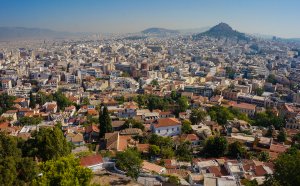
Facts About Athens, Greece
Athens was the largest city in Greece, and controlled a region called Attica. Between the many mountains were fertile valleys, with many farms. Athens became rich because Attica also had valuable sources of silver, lead and marble. Athens also had the biggest navy in Greece.
Athens was a beautiful and busy city. People came to the city from all over Greece, and from other countries, to study and to trade. The city's most famous building was the temple called the Parthenon. It stood on a rocky hill called the Acropolis. Inside the Parthenon stood a statue of the city's protector-goddess Athena.
People power
In the early 500s BC a new way of government was invented in Athens. It was "democracy" or "'rule by the people". Not everyone had a vote though. Only a male citizen had a say in how the city was run. There were about 30, 000 citizens. The ruling Council had 500 members, all men, and chosen for a year at a time. Women could not be citizens, nor could slaves or foreigners.
The citizens met to vote on new laws put forward by the Council. Usually around 5, 000 citizens met, every 10 days or so on a hill called the Pnyx. In Athens, you can still see the stones of this historic meeting place.
Guilty or not guilty?
Athens had law courts with trial by jury. Juries were larger than the ones we have today - 500 citizens normally, but sometimes more. There were no lawyers, so people spoke in their own defence. After listening to the evidence, jurors voted by placing metal discs into one of two jars - one for guilty, one for not guilty. Punishments included the death penalty. Speeches were timed by a water-clock, as shown in the pictures.
Citizens also voted to get rid of politicians they did not like. They wrote the name of the person they hated on a piece of broken pottery, called an ostrakon. Any politician who got more than 600 votes was banished from the city of 10 years.
Slaves
Of the 250, 000 to 300, 000 people in Athens (at its biggest), between a quarter and a third of them were slaves. Some slaves were captured in wars. Others were born slaves. Some people were forced into slavery when they could not afford to pay money they owed. Some slaves were owned by the state, like slave-archers from Scythia, who were used as "police" by the Athens government.
Life in Athens
Athens had yearly festivals for athletics, drama and religious occasions. The city taxes paid some of the cost, but rich citizens had to pay extra. Important people in Athens were the strategoi, who were ten generals chosen from each of the ten "tribes" of citizens. There were also nine archons. Their jobs were mostly ceremonial, to do with festivals and family matters. One of the archons had to organize the Dionysia Festival, for the god Dionysos, every year. It was a time for fun, wine-drinking, parties and plays.
RELATED VIDEO



Share this Post
Related posts
About Athens Greece
The ancient Greeks (mainly the ) were a unique people. They believed that individuals should be free as long as they acted…
Read MoreVisit Athens Greece
Courtesy of The Acropolis Museum THE SCENE Athens can seem like an intense, somewhat rough-around-the-edges city that you…
Read More










